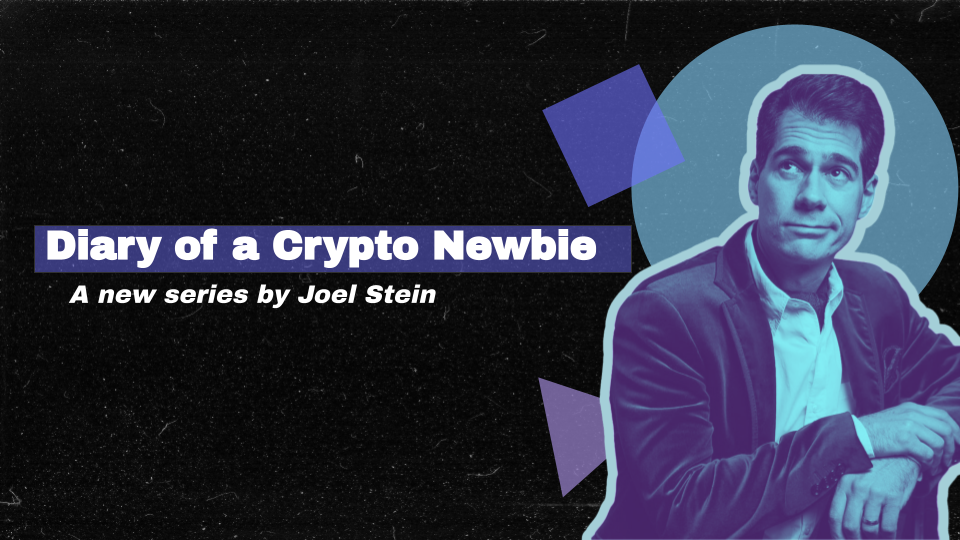This is Part 6 of a special Forkast series on humorist Joel Stein’s adventures in blockchain. In Parts 1 to 5, he opens a crypto wallet, immerses in play-to-earn as an Axie Infinity gamer, shops for metaverse real estate, STEPNs it up for crypto move-to-earn, and discovers the secrets of life as a crypto day trader.
_________________________________
During a panel that I moderated at USC on Web3, I asked Jai Bhavnani, who ran a crypto fund, what he was thinking about investing in next. He told me he thought there was money to be made in simping. I asked him what simping was. Everybody in the audience giggled.
“Is it a sex thing?” I asked.
More tittering.
“It’s a sex thing!” I said, proud that I figured it out so quickly. I wanted to know what kind of sex thing, but Bhavnani wouldn’t tell me. I asked the rest of the panel. And the audience. The laughter grew louder as I said, “No one is leaving this room until I find out what ‘simping’ is!” At which point the event host, Tina Sharkey, strode on stage and told me, in no uncertain terms, to move on.
As soon as I got outside, I Googled “simping.”
It’s not a sex thing. But it was thought to be an unmanly thing to do — until simps decided to reclaim the insult and not to feel ashamed by what they do anymore.
The word probably got its current usage from Too Short’s song, “Pimpology,” the one in which he brags that his father sent him to pimp school when he was 3 years old. In it, he raps:
… if you can’t pimp
And the hos keep treating you like a simp
I don’t know what to say about you boys
You better go to the store and buy some toys
In that song’s 1990 world, a simp is a man who is overly servile to a woman who doesn’t return his ardor. A lovestruck guy stuck in the friend zone. Gunther, the barista from Friends who pines for Rachel.
But, like so much in modern language and culture, the word “simp” got reappropriated. Like cryptocurrency traders who proudly call themselves “degens” (degenerate gamblers), young men now proudly identify themselves as simps, or guys who pour their affections onto “e-girls” who create content featuring themselves on Twitch, TikTok and Instagram.
Simping can involve posting syrupy supportive comments, “white knighting” (defending the e-girl from other posters’ slightest slight), volunteering to work on the e-girl’s creator businesses, and lavishing the e-girl with money and gifts.
As Kylesimps proudly raps in his song, “S.I.M.P.”:
I am a S-I-M-P
Spending money and I still feel empty
Say you love me ’til my pocket’s emptied
All those simp pockets emptying means big business for e-girl content creators. The 28-year-old Twitch streamer Amouranth (real name: Kaitlyn Michelle Siragusa) has grossed nearly US$34 million in less than two years on OnlyFans and sold jars of both her hot tub water (US$200) and her farts (US$1,000), which I would have guessed would have been priced the opposite way. Pokimane (real name: Imane Anys), one of the most followed female streamers on Twitch, claimed to feel so guilty about the massive amounts of money that her simps gave her that she limited donations to US$5.
Trevor Evarts, the 23-year-old host of the podcast, “Trevor Talks Too Much,” and culinary producer of the YouTube show “Good Mythical Morning,” told me that when he was dating an e-girl with more than 50,000 Twitter followers, he felt a little freaked out by her simps. “I couldn’t figure out why people do it,” he said. “There’s no transaction. She wasn’t sending them anything. They were just giving her money for existing.”

He eventually realized that these were parasocial, or one-sided relationships that can border on obsession. “It’s not like donating to NPR or Wikipedia,” Evarts said. “They have a warped view that there is a sort of relationship. Whereas from the streamers’ perspective, there’s nothing going on there.”
It wasn’t just panelist Bhavnani and Amouranth — the OnlyFans millionaire who offered 1,000 “limited edition” jars of her gastrointestinal emissions for US$1,000 each — who saw dollars signs in simping. So did Irene Zhao, a 28-year-old Chinese-born Instagram model with more than 440,000 followers who recently launched what might be the first blockchain-based fan club for simps.
When she was 16, Zhao moved from southern China to Singapore on a Singapore Ministry of Education scholarship. She then attended the prestigious National University of Singapore, majoring in communications and new media, and posted on Instagram in her spare time. After graduation, she worked as a commodities broker and chief marketing officer for a decentralized finance company called Konomi Network.
Zhao then decided to combine her Instagram fan base and blockchain knowledge by starting her own DAO, a decentralized autonomous organization in which her supporters can buy voting shares that determine what their pool of money should do. Her DAO is like a company without a board, executives, managers or employees but run entirely by computer code and its all-simp membership.
She launched IreneDAO on January 14. Its motto is “Simplicity, integrity, meaning, and purpose” — a backronym for “S.I.M.P.” To join, you have to buy a non-fungible token that features a photo of Irene Zhao. She sold US$7.5 million worth of IreneDAO NFTs in just 10 days and now counts billionaire investor Mike Novogratz and pro wrestler and YouTuber Logan Paul among her simps.
If those alpha guys are simping, it made me want to simp, too.
Simping for Irene Zhao might also be the Web3 investing opportunity I am most suited for. When I look at myself in the mirror, I don’t see a crypto miner. I don’t see a Bitcoin day trader. Nor do I see myself hitting the jackpot as a metaverse real estate mogul or a play-to-earn multilevel marketing manager. I see a sensitive, caring and big-hearted guy who stays up all night listening to a woman talk about how her boyfriend mistreats her and then going home alone to fantasize about her staying up all night with him talking about how her boyfriend mistreats her. But now, thanks to the blockchain, if the object of my affections breaks my heart beyond repair, I can sell my spot as her simp to the highest bidder.
Unfortunately, like all things I’m discovering about blockchain, Web3 simping was not that easy to get into. In order to buy the IreneDAO NFT — the price of entry into this superfan club — I had to first convert the Ethereum in my Coinbase Wallet into Wrapped Ethereum, which I’ve finally understood to mean a special type of Ethereum that no one can wrap their head around. Then I had to move my Wrapped Ethereum to the OpenSea NFT marketplace and bid on the IreneDAO NFTs.
All the NFTs were photos of Zhao with a crypto bro meme written on them, like “take my money” and “focus on the tech, ser.” I lost out on the bid for one of Zhao sitting with some kind of mimosa-looking drink emblazoned with the words, “Have fun staying poor.”
I also didn’t score one of Zhao in a sparkly gown holding a sign that simply said, “Simp.”
The ones of her in a red dress saying “pamp it” and “damp it” were out of my simping budget, as each had an asking price of more than US$2,500. Plus, these NFTs seemed particularly economically risky to me because those phrases mean “pump and dump,” a shady practice in which someone creates or buys a lot of crypto, boosts its price through exaggerated claims or outright false statements, and then sells it for a huge profit while suckers who bought high are left with huge losses.


After a few disappointing weeks of getting outbid, I stopped being so picky and posted an offer of 0.35 Ethereum (US$474 at the time) for any NFT that would get me a pass into IreneDAO. That same day, someone named “BANANA_STAND” stepped up and sold me an NFT of Zhao in a belly button-baring golf outfit with a background that proclaimed: “Need this to launch soon, like very soon. Everyday I wake up and check if SOCOL has launched, it hasn’t and I’m freaking out. Can Irene pls dooooo something.”
When the NFT arrived in my Coinbase wallet, I couldn’t stop gazing at it. It was my first NFT and I loved it like an art collector would after buying his first Modigliani, if among the layers of paint Modigliani had also written “doooooo something.” I would open my phone and admire its beauty — her Mona Lisa-like semi-smile and look of determination, the baby pink outfit against the algae-green background, the way “something” so perfectly followed “dooooo.”
I do not know exactly why BANANA_STAND was willing to part with this NFT, but it made me question his commitment to simping. My love for this image of Zhao could not be bought for as cheap as 0.35 Ethereum, especially considering where Ethereum is right now.
Once I verified my NFT ownership via the IreneDAO Discord channel, I was now in — and allowed to vote on how we DAO serfs could best serve our queen. Irene herself was on the channel in the “simp-chat” section, often saying, “good morning.” Which motivated us, her faithful, to reply with lines such as, “I just wan to help Irene to sweep her floor” and “Wow she look so cool.” One simp named “Sav” won the fan art competition by Photoshopping a picture of him and Zhao getting married. The grand prize he won was another IreneDAO NFT.
The financial workings of the DAO itself, however, were as mysterious to me as her Mona Lisa smile on my NFT. The Discord channel explained the DAO’s goal as “Revolutionizing the creator economy with simp to earn, empowering mankind by utilizing web3 tools, making meaningful donations to help our children and women in need, supporting minorities and women-led projects, leading with example as IreneDAO is the pioneer of all creator DAOs.” I had no idea what any of that meant. But soon I realized it wasn’t quite the lusting-from-afar I was here to get on the ground floor of.
I had no interest in voting on whether we should invest 1% of the IreneDAO treasury in Mutant Cats NFTs (proposal idea #6) or buy one Mutant Ape NFT (proposal idea #7). In fact, I thought even talking about mutant animals was an insult to Zhao, who was a beautiful, smart human already perfect the way she was, with no apparent mutations whatsoever.
I longed to simp harder and better than my 453 fellow NFT-holder rivals, who collectively own 1,104 more of the DAO’s voting shares than I do. Should I send her flowers? Money? Tweet about how great she is? The frustrating part was that I didn’t even know what Zhao’s love language was. I only knew that I wanted to doooooo something.
So, I sent Zhao a direct message on Twitter asking if we could Zoom so she could teach me how to simp her. We set up a time: 9 p.m. on a Friday night for me in Los Angeles, which is prime date time, though less so in Singapore, where she was.
I went into my closet and picked out a navy suit and sky-blue-and-white striped tie. But I feared it didn’t appear simpy enough. So, I put on a pocketed polo shirt instead.
Zhao appeared exactly on time. She was sitting in her apartment, in makeup and a bright yellow dress, sipping a Hong Kong milk tea, looking very ready to be simped.
I asked her how to best simp her. She said, “Write something good about me.” When I asked if I should focus on her brains or her beauty, Zhao gave me a look that let me know that I need to try harder — and to look deeper within.
“You should find your own reason to simp. You shouldn’t be asking me,” she told me. I hated myself in the way that Gunther on Friends must have.
Zhao said that I didn’t need to buy her gifts. “People send me money. But it’s not money that I need most. It’s emotional or social support. Like when people say bad things about you, they say, ‘She’s not the type of person that you are mentioning.’”
Simping, she explained, isn’t the one-sided, parasocial relationship that people like Evarts assumed. In fact, she said that she would date someone simping her. “It’s not that I’m superior, just because you are simping me,” she explained in a way that sounded sincere. She said she’s met a lot of people in Web3 who are far more successful than she is and admired how they stayed humble. Decentralization, after all, is supposed to eliminate hierarchies and be all about equal opportunities.
In fact, Zhao said, I had simping all wrong. As had she.
She first heard about simping when she was in a video with YouTubers who were more famous than she was at the time. In the comments, some people said they were simping for her. Which confused her. Especially since some of the most supportive comments were written by women. But eventually she figured out why they were acting this way.
“This is very common in Chinese or Korean pop cultures. All these fan boys or fan girls are crazy about these boy bands. Fans will buy birthday billboards in Times Square just to celebrate their idol’s birthday. Or ads at bus stops,” she said. “They’re getting the productive energy from idols.”
“A lot of people have this negative attitude about simping. They feel like all the simps are just stupid. That they’re just putting money into someone who they will probably never have a chance to meet in real life,” Zhao said. “They don’t understand the culture.
Because many Asian pop stars become famous in their early teens, many fans are older. They call themselves “mom fans,” and have maternal feelings toward these young stars. That desire to protect and nurture another, she said, is one of the main emotional undercurrents of simping.
Another is admiration. “Guys buy the signature sneakers of their favorite basketball players. Buying a girls’ NFTs is the same thing. If you like Michael Jordan, it’s because you think he’s very hard working and ambitious and those are qualities that make you look up to him. And when you simp for a creator, you see qualities within her.”
Simping is also being part of a community. If you identify as an Irene Zhao superfan, you’re probably going to have some things in common with other Irene Zhao fans. So, you meet on her Discord channel or Twitter feed. Simping is a way of flying a flag to find your people.
And thanks to Web3, simps can now own part of their community organized around idols like Irene Zhao.
The people who minted her NFTs got almost all the initial US$7.5 million, Zhao said, adding that she collected only 5% of it — half of which she is donating to charity and the other half to expenses for operating the DAO. The simp in me didn’t just buy a pair of Air Jordans. I now own part of Irene Zhao’s marketing company.
In fact, IreneDAO is just a proof of concept for Zhao’s upcoming company, So-Col, which stands for “Social Collectables” and is referenced in the message on the NFT I bought. It hopes to be a social media company that moves influencers and fans into Web3, where both sides will profit directly instead of Facebook or YouTube or Twitter. Where an Instagram star like her doesn’t have to do product placements to make money and fans don’t have to endure ads or sponsored posts — and can resell their ownership stake to other fans, maybe at a profit. Earlier this year, investors including blockchain gaming giant Animoca Brands invested US$1.75 million in Zhao’s So-Col, giving it a value of US$100 million.
I brimmed with pride to be a simp of someone so kind, smart, successful and humble. “I feel like I’ve chosen very well,” I told Zhao. After all, I could be simping someone who farts into jars and bottles up her dirty bathwater as if it was from Lourdes. Instead, I was simping for someone who was making me see simping behavior in a much more pro-social light.
As I said goodbye, Zhao cooed, “I’m simping for you, too.”
“I’m not comfortable with that,” I told her. She’s the one who is supposed to be on a pedestal. Simping is clearly a guy thing for women — at least as defined on the internet and 1990s TV.
“I want to simp for some writer who knows how to talk nicely to people. And is a Stanford graduate who supports his entrepreneur friends,” she said.
I left our Zoom room feeling so inspired that I daydreamed about minting my own NFTs for a JoelSteinDAO. Simping for simps could be the next big Web3 idea.





